frankie collins
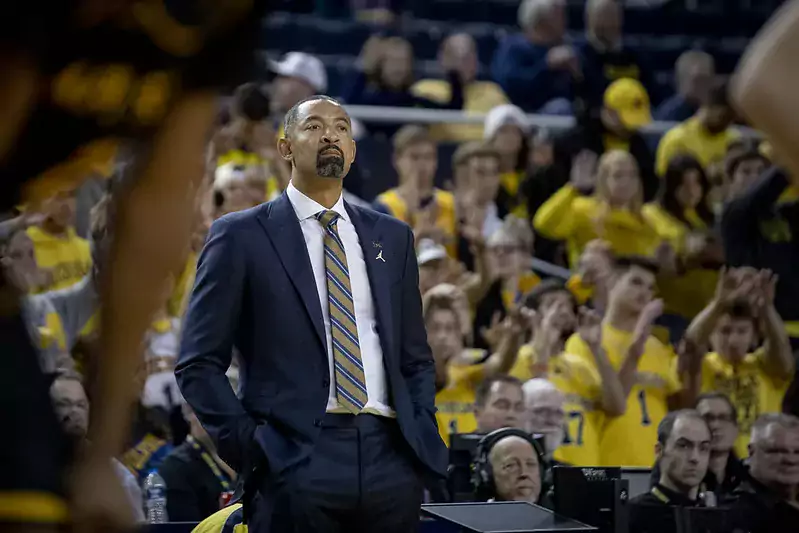
On November 16, 2021, the University of Michigan gave a five-year extension to Men's Basketball Head Coach Juwan Howard, something your author called "a no brainer". At the time, Michigan was #4 in the country, 2-0 on the young season after knocking off Buffalo and Prairie View A&M. To that point, Howard's record as Michigan's head coach was 44-17, coming off a Big Ten regular title and an Elite Eight appearance. The team he was coaching was hyped, with sky high expectations following 2020-21's roaring success and adding a recruiting class that public scouting services loved. It all made sense. After all, Michigan Men's Basketball had established itself as a giant of the B1G over the preceding decade, winning three regular season titles and two conference tournament titles, making the Sweet 16 six times, the Elite Eight four times, and the Final Four twice.
That night, after the extension was announced, Michigan played host to a so-so Seton Hall team that would make the NCAAs as an eight seed. They lost that game, the first sign that the 2021-22 team was perhaps not going to be what the expectations have conveyed. In hindsight, it was the beginning of a larger slide into despair for the Michigan program. Beginning with that game, the men's basketball team is 43-47 in their past 90 games, leading up to the present. They slipped into the NCAA Tournament as an 11 seed, then missed the tournament the following season, culminating in this year, when Michigan is 8-16 and has a chance to be the first Michigan team to win only single digit games in four decades.
How did it all collapse so quickly? Today we will look back through the journey and perhaps glean some overarching lessons on where and how it all went wrong:
[AFTER THE JUMP: How it all went wrong]

Michigan landed transfer G Jaelin Llewellyn out of the transfer portal last week, a move that then sent repercussions across the roster as Frankie Collins decided to exit for the portal himself. Frankie's decision is neither here nor there, and today we will be focusing on Llewellyn himself. A four year player at Princeton who only competed in three seasons (due to the Ivy League canceling athletics for 2020-21), Llewellyn was twice named All-Ivy League for the Tigers.
He attended Virginia Episcopal School to close out his HS days, but Llewellyn is actually Canadian, hailing from Mississauga, Ontario. That gargantuan Toronto suburb may sound familiar to Michigan basketball fans, as it is also the hometown of Nick Stauskas and (Llewellyn's possible teammate) Caleb Houstan. Llewellyn measures 6'2", 175 lbs., not terribly tall, but also a rather skinny frame. For context, DeVante' Jones was listed one inch shorter, but had 25 extra lbs. on Llewellyn.
Another interesting piece of information on Llewellyn before we get really rolling from his HS days is that from a scouting standpoint, he's not your everyday Ivy League recruit. A quick scan at his 247 page from the class of 2018 will tell you that he was actually a solid 4* recruit, landing in the top 100 of the composite (!). He had offers from several P5 schools, including B1G rivals Ohio State and Purdue before committing to Princeton. Finally, I know his name is a bit confusing to look at, but it's pronounced "Lou-well-in". Not super difficult!
STATS
We have to start the stats section by providing a bit of context conference-wise. The Ivy is a decent mid-major conference, and Michigan obviously has some reference with it, having acquired a player out of that league just a couple years ago (Mike Smith and Columbia). KenPom's conference ratings had the Ivy as the 18th-best conference in 2021-22, one spot below the Sun Belt, which produced Michigan's last transfer guard (DeVante' Jones).
Princeton was a good team for a mid-major last season, finishing 23-7 overall and 12-2 in the Ivy, which netted them the regular season crown. From an efficiency standpoint, they were in line with the worst teams in the B1G, like Minnesota. They won their Ivy League semifinal matchup against Cornell but lost the conference tournament title game to Yale by two points, and thus were shipped to the NIT where they lost to VCU. At Princeton, Llewellyn was playing PG, but was both on-ball and off-ball in terms of his role, with a nearly even distribution of possessions split between the two.
The distribution of play types didn't change much at all over his three seasons playing for Princeton. In each one, about 30% of his plays were spot-ups, 20-25% were as the pick-and-roll ball-handler, ~13% were in transition, 5-10% were dribble hand-offs, and ~10% were isolation.
Though the play type distribution didn't change that much between 2019 and 2022, Llewellyn's ability to execute those plays with efficiency did, as he became considerably more efficient as a scorer. As a freshman, Synergy rated his abilities in four of those five play types as bottom quartile in college hoops, with only his transition possessions being considered "average". This past season, however, all but his spot up game were ranked in the upper quartile, and even his spot ups were still 37th percentile, good enough for an "average" rating.
Here are his three seasons at Princeton, with numbers pulled from KenPom:
| USG | ORtg | eFG% | TS% | ARate | TO% | FTRate | FT | 2P | 3P | |
|---|---|---|---|---|---|---|---|---|---|---|
| 2018-19 | 25.1 | 82.0 | 37.9 | 39.4 | 15.2 | 13.7 | 15.2 | 21-37 (56.8%) | 58-153 (37.9%) | 23-91 (25.3%) |
| 2019-20 | 28.7 | 101.5 | 46.0 | 50.6 | 14.7 | 12.5 | 30.9 | 85-109 (78.0%) | 92-200 (46.0%) | 47-153 (30.7%) |
| 2021-22 | 27.5 | 106.6 | 52.7 | 54.1 | 13.1 | 13.1 | 15.2 | 39-56 (69.6%) | 101-206 (49.0%) | 62-162 (38.3%) |
You can see how grisly that freshman season was offensively, a ghastly 2P% and TS% and an ORtg in the gutter despite high usage. His eFG% improved steadily over the years despite the usage not changing all that much, and the big change in his game was the development of that three point shot. His free throw percentage improved some, but not the same consistent slope upwards. The assist rates are not that of a typical point guard, which is how you can see the role Llewellyn played in the offense, working off-ball at a pretty consistent clip.
We shouldn't dip too deep into the defensive metrics, but here's a few:
| DReb% | Stl% | Fouls/40 | DBPM | |
|---|---|---|---|---|
| 2018-19 | 8.2 | 1.0 | 2.0 | -0.8 |
| 2019-20 | 13.0 | 1.8 | 1.6 | -1.5 |
| 2021-22 | 11.3 | 1.2 | 1.9 | -2.3 |
Llewellyn is a decent defensive rebounder for a point guard. He doesn't produce a ton of steals, but his big talent among these stats are his ability to stay out of foul trouble. His fouls/40 clip was top 200 in college basketball all three seasons. The DBPM numbers are not good, and while it's pertinent to point out that Princeton was a bad defensive team (250th in defensive efficiency), Llewellyn's DBPM is worse than that of some of his fellow starters. That said, those sorts of stats often paint inconclusive pictures of a player's ability.
[AFTER THE JUMP: Some video and takes]
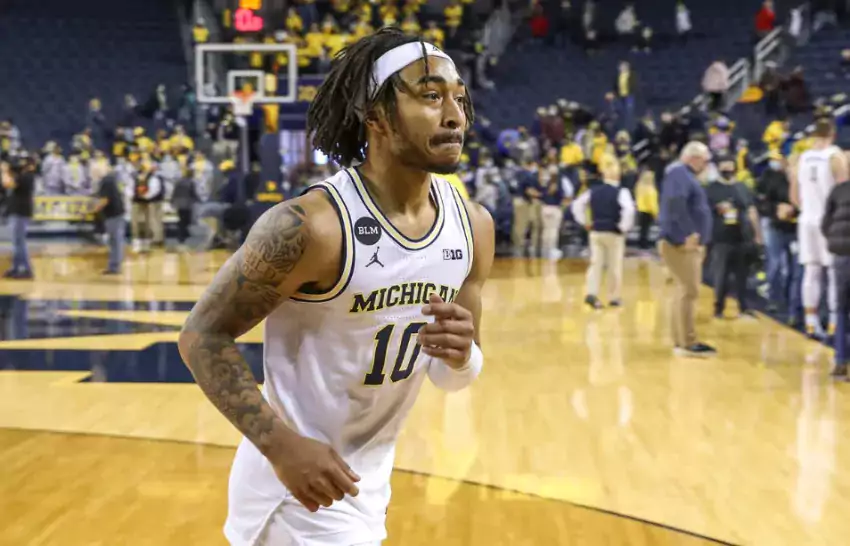
It makes no sense, and total sense, and lots of people who think they possess sense are going to imagine themselves capable of passing it on. It's all in vain. Frankie Collins, projected to be Michigan's point guard of the immediate future, is entering the transfer portal.
I'm sure there's an announcement or something I can place here...I'm writing this last night and spending my Saturday trying not to dwell.
After a much-needed freshman year behind Devante' Jones, Collins was—at least in every mind but his—guaranteed to start the majority of Michigan's possessions next year. Shooting aside, his on-ball defense got Michigan to the Sweet 16, and there were more than enough flashes of his finishing at the rim and passing acumen to expect Collins would grow into a taller Zavier Simpson.
Clearly, Collins felt he'd been recruited over when Michigan picked up transfer guard Jaelin Llewellyn, even though he wasn't recruited over, because Llewellyn is a shooting guard and Frankie can't shoot. Again, if that was something that could be communicated it's past.
Unfortunately for Michigan it's still true, which means they're probably going to have to go shopping in the portal for a 30-minute point guard, either a grad transfer, a freshman willing to start his education over, or someone from the rare school our admissions tweeds will concede is a college.
It's 2022, however, so there are some names still out there. Iowa State's Tyrese Hunter was a freshman at an until-recently AAU school. He recently cut down his list to KU, Texas, Tennessee, Purdue, and Zaga, but that was before Michigan opened up—he's originally from Racine, Wisconsin.

A big win when it was sorely needed
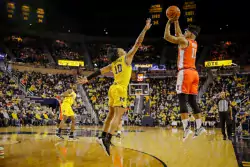
Personnel Problems In The Backcourt

Weekly Hoops Trends

The kids are alright (tonight)
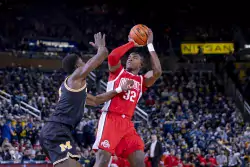
Wish we had saved some of those threes from Thursday for today!

Weekly Hoop Trends


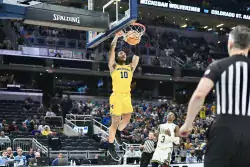
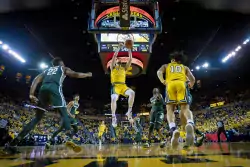
167